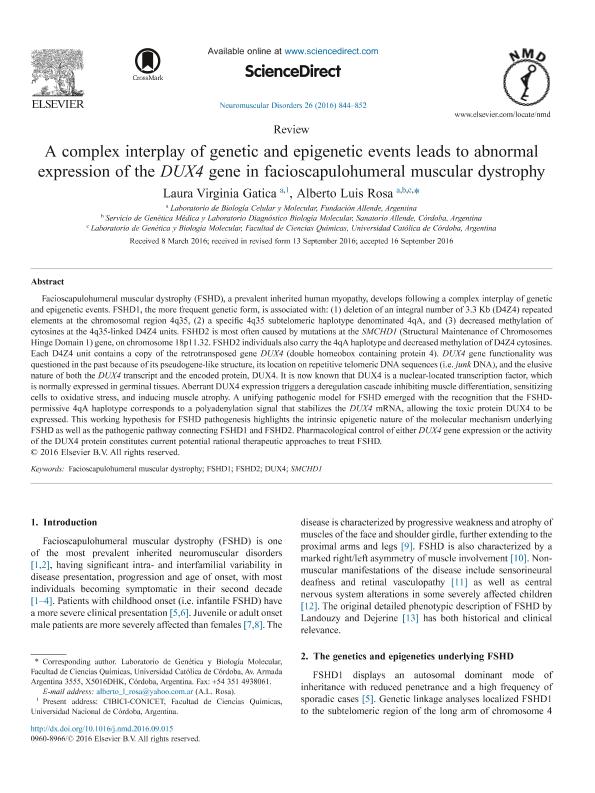Artículo
A complex interplay of genetic and epigenetic events leads to abnormal expression of the DUX4 gene in facioscapulohumeral muscular dystrophy
Fecha de publicación:
12/2016
Editorial:
Pergamon-Elsevier Science Ltd
Revista:
Neuromuscular Disorders
ISSN:
0960-8966
e-ISSN:
1873-2364
Idioma:
Inglés
Tipo de recurso:
Artículo publicado
Clasificación temática:
Resumen
Facioscapulohumeral muscular dystrophy (FSHD), a prevalent inherited human myopathy, develops following a complex interplay of genetic and epigenetic events. FSHD1, the more frequent genetic form, is associated with: (1) deletion of an integral number of 3.3 Kb (D4Z4) repeated elements at the chromosomal region 4q35, (2) a specific 4q35 subtelomeric haplotype denominated 4qA, and (3) decreased methylation of cytosines at the 4q35-linked D4Z4 units. FSHD2 is most often caused by mutations at the SMCHD1 (Structural Maintenance of Chromosomes Hinge Domain 1) gene, on chromosome 18p11.32. FSHD2 individuals also carry the 4qA haplotype and decreased methylation of D4Z4 cytosines. Each D4Z4 unit contains a copy of the retrotransposed gene DUX4 (double homeobox containing protein 4). DUX4 gene functionality was questioned in the past because of its pseudogene-like structure, its location on repetitive telomeric DNA sequences (i.e. junk DNA), and the elusive nature of both the DUX4 transcript and the encoded protein, DUX4. It is now known that DUX4 is a nuclear-located transcription factor, which is normally expressed in germinal tissues. Aberrant DUX4 expression triggers a deregulation cascade inhibiting muscle differentiation, sensitizing cells to oxidative stress, and inducing muscle atrophy. A unifying pathogenic model for FSHD emerged with the recognition that the FSHD-permissive 4qA haplotype corresponds to a polyadenylation signal that stabilizes the DUX4 mRNA, allowing the toxic protein DUX4 to be expressed. This working hypothesis for FSHD pathogenesis highlights the intrinsic epigenetic nature of the molecular mechanism underlying FSHD as well as the pathogenic pathway connecting FSHD1 and FSHD2. Pharmacological control of either DUX4 gene expression or the activity of the DUX4 protein constitutes current potential rational therapeutic approaches to treat FSHD.
Palabras clave:
Dux4
,
Facioscapulohumeral Muscular Dystrophy
,
Fshd1
,
Fshd2
,
Smchd1
Archivos asociados
Licencia
Identificadores
Colecciones
Articulos(CIBICI)
Articulos de CENTRO DE INV.EN BIOQUI.CLINICA E INMUNOLOGIA
Articulos de CENTRO DE INV.EN BIOQUI.CLINICA E INMUNOLOGIA
Citación
Gatica, Laura Virginia; Rosa, Alberto Luis; A complex interplay of genetic and epigenetic events leads to abnormal expression of the DUX4 gene in facioscapulohumeral muscular dystrophy; Pergamon-Elsevier Science Ltd; Neuromuscular Disorders; 26; 12; 12-2016; 844-852
Compartir
Altmétricas




